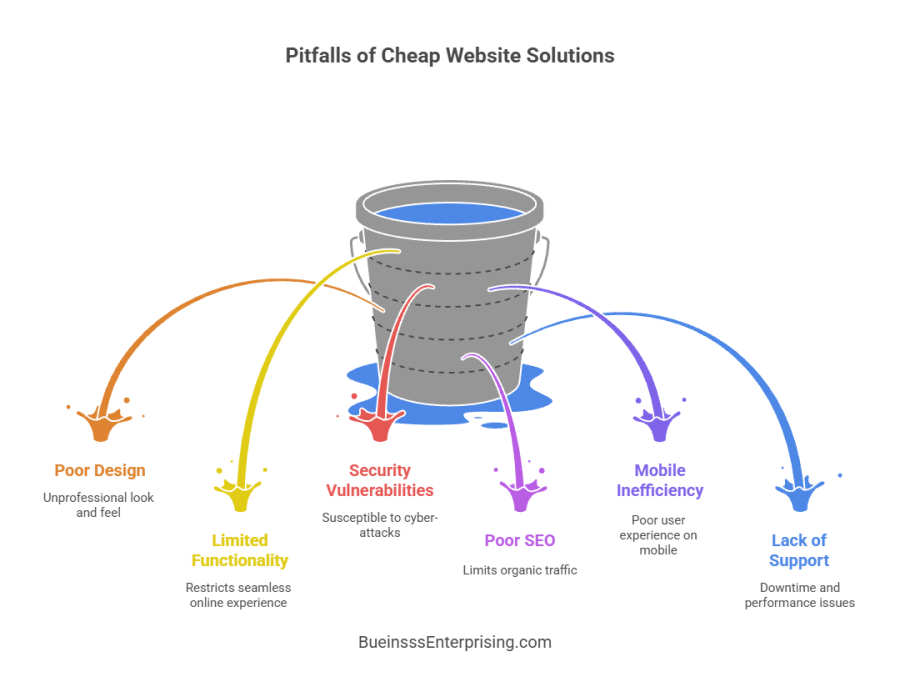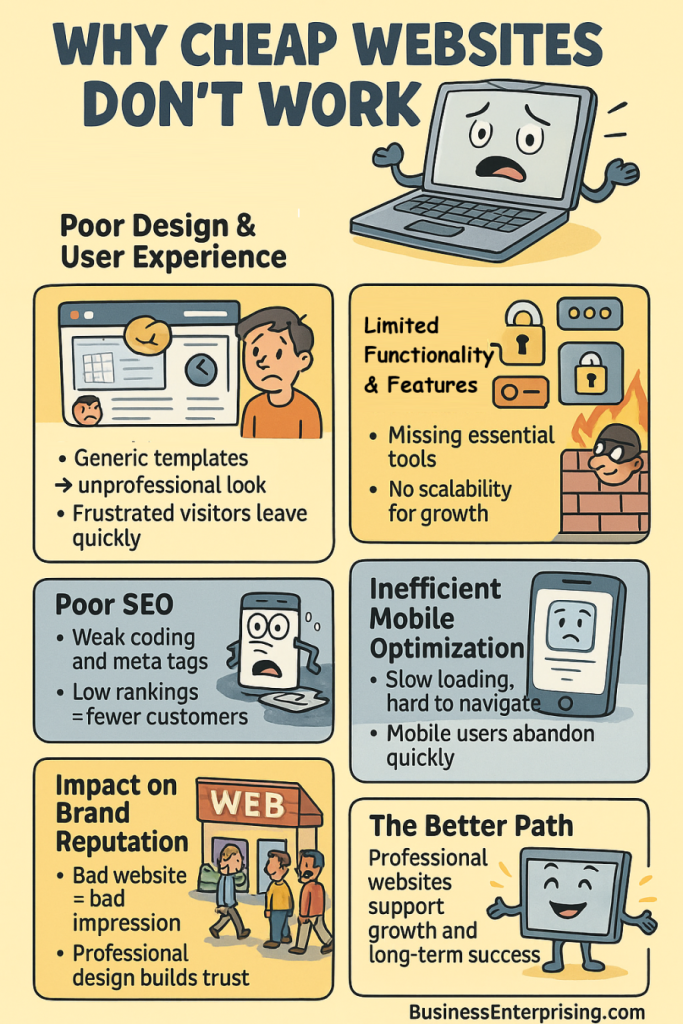 In today’s digital age, having a professional website is crucial for any business aiming to establish a strong online presence. However, the temptation to cut costs often leads businesses to opt for cheap website solutions. While these budget-friendly options may seem attractive initially, they come with numerous pitfalls and risks that can hinder long-term success. Let’s get into why cheap websites don’t work and often fail to deliver the desired results. We’ll also explore the potential consequences for businesses that prioritize cost over quality.
In today’s digital age, having a professional website is crucial for any business aiming to establish a strong online presence. However, the temptation to cut costs often leads businesses to opt for cheap website solutions. While these budget-friendly options may seem attractive initially, they come with numerous pitfalls and risks that can hinder long-term success. Let’s get into why cheap websites don’t work and often fail to deliver the desired results. We’ll also explore the potential consequences for businesses that prioritize cost over quality.
Poor Design and User Experience
One of the most significant reasons why cheap websites don’t work is poor design and weak user experience. To begin with, cheap website builders often rely on generic templates and limited customization options. As a result, many websites appear unprofessional and lack uniqueness. Furthermore, they fail to reflect brand identity effectively, which makes it difficult to establish a distinct online presence. In addition, the lack of design flexibility often means that the website cannot meet the specific needs of the target audience.
Moreover, user experience is another critical aspect that suffers with cheap websites. For example, a poorly designed site can create navigation issues, slow loading times, and a cluttered layout. Consequently, these shortcomings frustrate visitors and drive them away. On the other hand, a well-designed website with intuitive navigation, fast loading times, and a clean layout significantly improves user experience. Therefore, visitors are more likely to stay longer and engage with the content. Ultimately, prioritizing user experience is essential if you want to retain visitors and convert them into loyal customers.
Limited Functionality and Features
Another reason why cheap websites don’t work is that they often come with limited functionality and features. This restricts the business’ ability to provide a seamless online experience. These limitations can include basic e-commerce capabilities, inadequate content management systems, and lack of integration with other tools and platforms. For example, a business that relies on online sales may find that a cheap website lacks essential features such as secure payment gateways, inventory management, and customer support integrations.
Moreover, as businesses grow and evolve, their website needs become more complex. Cheap website solutions often lack scalability, making it difficult to add new features or expand the website’s capabilities. This can result in the need for costly and time-consuming website overhauls in the future. Investing in a robust and scalable website solution from the outset ensures that the business can adapt to changing needs and continue to provide a high-quality online experience.
Security Vulnerabilities
Security is a critical concern for any website, particularly those handling sensitive customer information and transactions. Cheap websites often come with inadequate security measures, making them vulnerable to cyber-attacks, data breaches, and other security threats. These vulnerabilities can result from outdated software, lack of regular updates, and insufficient encryption protocols.
A security breach can have severe consequences for a business, including financial losses, damage to reputation, and loss of customer trust. Implementing robust security measures is essential for protecting sensitive data and ensuring the integrity of the website. Investing in a professional website solution with advanced security features can mitigate these risks and provide peace of mind for both the business and its customers.
Poor Search Engine Optimization
Search engine optimization (SEO) is crucial for driving organic traffic to a website and improving its visibility on search engines. Cheap websites often lack the necessary SEO features and optimizations, making it challenging for businesses to rank well on search engine results pages (SERPs). This can result from poorly structured code, lack of meta tags, and limited control over on-page SEO elements.
A website that is not optimized for search engines will struggle to attract organic traffic, limiting its ability to reach potential customers. Investing in a website with strong SEO capabilities ensures that the business can implement effective SEO strategies and improve its search engine rankings. This includes optimizing content, improving site speed, as well as implementing responsive design, all of which contribute to better SEO performance.
Inefficient Mobile Optimization
With the increasing use of mobile devices for browsing and shopping, having a mobile-optimized website is essential. Cheap websites often fail to provide efficient mobile optimization, resulting in a poor user experience on mobile devices. This can include issues such as non-responsive design, slow loading times, and difficult navigation on smaller screens.
A website that is not optimized for mobile devices risks losing a significant portion of potential customers who prefer to access the internet on their smartphones and tablets. Ensuring that the website is mobile-friendly enhances user experience, increases engagement, and improves conversion rates. Investing in a professional website solution with responsive design capabilities ensures that the website performs well on all devices.
Lack of Support and Maintenance
Ongoing support and maintenance are crucial for keeping a website running smoothly and efficiently. Cheap website solutions often lack adequate support and maintenance services, leaving businesses to deal with technical issues and updates on their own. This can result in downtime, performance issues, and outdated features that negatively impact the user experience.
Investing in a professional website solution typically includes access to reliable support and regular maintenance, ensuring that the website remains up-to-date and functioning optimally. This support can include troubleshooting, software updates, and performance monitoring, all of which contribute to a seamless online experience. Having access to expert support can save time and resources, allowing the business to focus on growth and development.
Impact on Brand Reputation
A website is often the first point of contact between a business and its potential customers. A poorly designed, slow, and unprofessional website can negatively impact the business’s brand reputation and credibility. Visitors are likely to associate the quality of the website with the quality of the products or services offered, making it crucial to provide a positive first impression.
Investing in a high-quality website demonstrates a commitment to professionalism and customer satisfaction. A well-designed and functional website enhances the brand image, builds trust, and encourages customer loyalty. By prioritizing quality over cost, businesses can create a strong online presence that reflects their values and attracts potential customers.
Conclusion
While cheap website solutions may seem appealing, the long-term consequences often outweigh the short-term savings. Poor design, limited functionality, security risks, weak SEO, inefficient mobile optimization, lack of support, and brand damage are common pitfalls. Investing in a professional website solution allows your business to provide a high-quality online experience and protect sensitive data. Additionally, a professional solution adapts to changing needs and supports long-term growth.
A website is a critical asset, and its quality should not be compromised for cost savings. By understanding why cheap websites fail, you can make informed decisions and prioritize both quality and functionality. Investing in a professional website solution secures your business’s future and creates the foundation for customer satisfaction. Moreover, it supports growth and long-term success. As the digital environment continues to evolve, having a reliable and effective website remains essential for achieving business objectives.
Inexpensive and poorly made websites typically lack the elements that Google looks for in a website, making it difficult for them to get ranked. They also tend to convert lower due to lack of detail such as calls to action and other important layout factors. These are just a few reasons why cheap websites don’t work.


